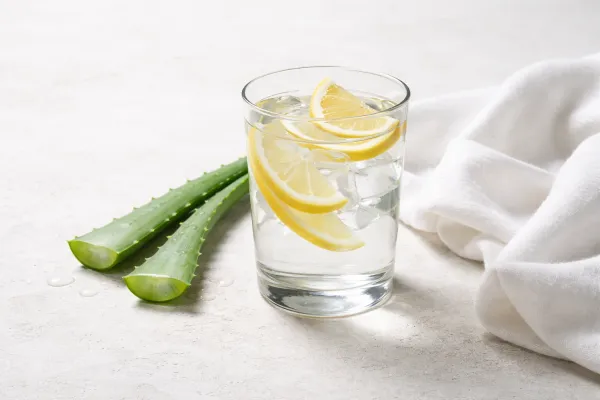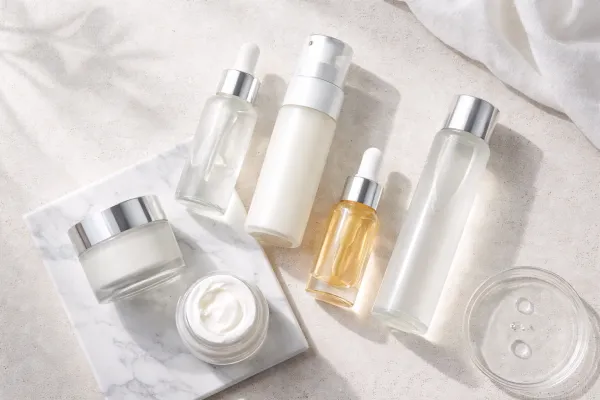Understanding Hydration vs Moisturization: Key Differences for Healthy Skin
Explore the key differences between hydration and moisturization for healthy skin. Tips for choosing the right products!

Understanding the difference between hydration and moisturization is essential for maintaining healthy skin.
While often used interchangeably, these terms refer to different aspects of skin care. Hydration involves adding water to the skin, while moisturization focuses on sealing that water in.
This article will explore their differences, how to recognize your skin's needs, and tips for choosing the right products to keep your skin looking its best.
Key Takeaways
- Hydration means adding water to the skin, while moisturization means sealing that water in.
- Dehydrated skin feels tight and looks dull; dry skin is flaky and lacks oil.
- Always choose products based on your skin type for the best results.
- Drinking enough water and eating hydrating foods are crucial for healthy skin.
- Avoid hot showers and harsh products that can worsen dryness.
Hydration vs Moisturization: What’s the Difference?

Defining Hydration and Moisturization
When we talk about skin care, it’s super important to know the difference between hydration and moisturization.
Hydration is all about water, while moisturization is about oil. Hydration adds water to our skin, making it feel plump and fresh, while moisturization locks that water in, preventing it from escaping.
So, if your skin feels tight and looks dull, it might be dehydrated and in need of hydration. On the other hand, if it feels rough and flaky, it’s likely dry and needs moisture.
How Each Affects Your Skin
Hydration helps our skin cells absorb water, which can make our skin look smooth and radiant. Moisturizers, on the other hand, create a barrier that keeps that water from evaporating.
Think of it this way: hydration is like giving your skin a drink, while moisturization is like putting a seal on that drink to keep it from spilling out.
Here’s a quick table to summarize:
Aspect | Hydration | Moisturization |
|---|---|---|
Function | Adds water | Locks in moisture |
Key Ingredients | Humectants (like hyaluronic acid) | Oils and emollients (like shea butter) |
Skin Type | Dehydrated skin | Dry skin |
Common Misconceptions
A lot of people think that hydration and moisturization are the same thing, but they’re not! Some products claim to do both, but it’s essential to understand what your skin really needs.
Remember, a hydrator adds water content to the skin while the moisturizer seals it in and prevents water loss. So, let’s be mindful of our skin’s needs and choose products accordingly!
Recognizing the Signs: Is Your Skin Dehydrated or Dry?
Symptoms of Dehydrated Skin
When we think about our skin, it’s important to know the signs of dehydration. If our skin feels tight, looks dull, or shows more fine lines than usual, we might be dealing with dehydration.
Dehydrated skin lacks water, and it can often feel uncomfortable.
Here are some common symptoms:
- Tightness after washing
- Dull complexion
- Increased visibility of fine lines
Symptoms of Dry Skin
On the flip side, dry skin is a different beast.
It lacks oil, which can lead to flakiness and rough patches. If we notice our skin feels rough or looks flaky, it’s likely dry.
Here are some signs to watch for:
- Flaky patches
- Rough texture
- Sensitivity or irritation
How to Test Your Skin Type
So, how do we figure out if our skin is dehydrated or dry? Here’s a simple test:
- Cleanse your face with a gentle cleanser.
- Wait for about an hour without applying any products.
- Observe how your skin feels:
- If it feels tight and looks dull, it’s likely dehydrated.
- If it feels rough or flaky, it’s probably dry.
Understanding the difference between dehydrated and dry skin is crucial for choosing the right products. Let’s keep our skin happy and healthy!
Choosing the Right Products for Your Skin Type

When it comes to skincare, we all know that one size doesn’t fit all.
Choosing the right products for our skin type is key to achieving that radiant glow we all want.
Let’s break it down together!
Best Hydrating Ingredients
- Hyaluronic Acid: This superstar can hold up to 1000 times its weight in water, making it a must-have for hydration.
- Glycerin: A great humectant that draws moisture into the skin.
- Aloe Vera: Known for its soothing properties, it also provides a nice hydration boost.
Top Moisturizing Ingredients
- Shea Butter: Perfect for locking in moisture and keeping our skin soft.
- Ceramides: These help restore the skin barrier, preventing moisture loss.
- Jojoba Oil: A lightweight oil that mimics our skin’s natural oils, making it great for all skin types.
Combining Hydration and Moisturization
- Layering: Start with a hydrating serum, then follow up with a moisturizer to lock in that hydration.
- Face Masks: Look for masks that combine both hydrating and moisturizing ingredients for a one-two punch.
- Experiment: Sometimes, it’s all about trial and error to find what feels best on our skin.
Remember, using a moisturizer can be a game changer. We can apply it on clean skin or after serum, and it works wonders both day and night!
Daily Skincare Routines for Optimal Hydration and Moisturization

Morning Routine Essentials
Let’s kick off our day with a solid morning routine! Here’s what we should do:
- Cleanse: Start with a gentle cleanser to wash away any overnight grime. We want to wake up our skin without stripping it of moisture.
- Hydrating Serum: Next, apply a hydrating serum. This is where we can really boost our skin’s hydration levels!
- Moisturizer: Don’t forget to finish with a lightweight moisturizer. This helps lock in all that good stuff we just put on.
- Sunscreen: And of course, sunscreen is a must! Protecting our skin from the sun is key to keeping it healthy.
Evening Routine Must-Haves
As the day winds down, it’s time to pamper our skin:
- Cleanse Again: Cleanse to remove the day’s buildup. A rich hydrating cleanser works wonders here.
- Repairing Serum: Apply a repairing serum packed with vitamins A, C, and E. This helps our skin recover overnight.
- Night Cream: Finish off with an intensive night cream. This is when our skin does a lot of its healing, so let’s give it the best chance!
- Optional Mask: Treat yourself to an overnight hydrating mask for that extra boost.
Remember, a consistent routine is essential for keeping our skin happy and hydrated. Let’s make it a habit!
Weekly Treatments and Masks
To keep our skin in top shape, we should also consider weekly treatments:
- Exfoliation: Use a gentle scrub or a chemical exfoliant once a week to remove dead skin cells.
- Hydrating Masks: Face masks can be a game-changer for our skin. They provide a boost of moisture and can be super relaxing! Look for masks with ingredients like aloe vera and honey.
By following these simple steps, we can help our skin feel revitalized and restore that beautiful glow we all want!
Lifestyle Tips for Better Skin Hydration and Moisturization
Keeping our skin hydrated and moisturized is super important, and it goes beyond just slapping on creams. Here are some tips we can all follow to keep our skin looking its best!
Diet and Nutrition
What we eat plays a huge role in our skin's health. Here are some foods we should include in our diet:
- Fruits and Vegetables: Water-rich options like cucumbers and oranges are fantastic for hydration.
- Healthy Fats: Foods high in omega-3 fats, like salmon and walnuts, help maintain skin moisture.
- Whole Grains: Foods like brown rice and quinoa provide essential nutrients for our skin.
Importance of Drinking Water
Staying hydrated is key!
We should aim for at least 8 glasses of water a day.
This helps keep our skin looking fresh and plump. Here’s a quick tip: drink a glass of water before meals to help with digestion and hydration.
Environmental Factors to Consider
- Use a Humidifier: Especially in winter, a humidifier can add moisture to the air, helping our skin stay hydrated.
- Limit Hot Showers: Hot water can strip our skin of moisture. Instead, let’s try to:
- Limit showers to 5-10 minutes.
- Use warm water instead of hot.
- Apply moisturizer right after drying off.
Remember, keeping our skin hydrated is not just about what we put on it, but also about how we protect it from the world around us. By being mindful of these factors, we can help our skin stay hydrated and healthy!
Common Mistakes to Avoid in Your Skincare Routine

When it comes to keeping our skin looking its best, we often trip over some common mistakes. Let’s break down a few of these so we can keep our skin glowing!
Over-Exfoliating
Exfoliating is great, but too much can be a real problem. We need to remember that our skin has a barrier that protects it. If we scrub too hard or too often, we can strip away that barrier, leading to more dehydration. Here’s a quick guide:
Frequency | Recommended Action |
|---|---|
Daily | Avoid exfoliating; stick to cleansing |
2-3 times a week | Use gentle exfoliants |
Once a week | Consider stronger exfoliants |
Using Harsh Cleansers
We might think that strong cleansers will do the trick, but they can actually make things worse. Gentle, hydrating cleansers are the way to go. They help keep our skin’s moisture intact while still getting rid of dirt and oil.
Skipping Sunscreen
This is a biggie! Sunscreen isn’t just for sunny days. It’s essential every day, rain or shine. UV rays can cause our skin to lose moisture, leading to dehydration. So, let’s make it a habit to apply sunscreen every morning, no excuses!
Remember, taking care of our skin is a journey, not a race. Let’s be kind to our skin and avoid these common pitfalls!
By keeping these tips in mind, we can maintain a skincare routine that not only works but also feels good!
Natural Remedies for Hydrated and Moisturized Skin
Aloe Vera and Honey Masks
Using aloe vera and honey together is a fantastic way to hydrate our skin.
These natural ingredients can soothe and moisturize effectively. Just mix equal parts of aloe vera gel and honey, apply it to our face, and let it sit for about 20 minutes before rinsing off.
This mask not only hydrates but also helps in healing any irritation. Aloe vera and honey are common kitchen ingredients!
DIY Hydrating Serums
Creating our own hydrating serum is super easy!
We can combine a few drops of essential oils like jojoba or argan oil with a carrier oil. This blend can deeply moisturize our skin and lock in hydration. Just remember to do a patch test first to avoid any reactions!
Benefits of Facial Oils
Facial oils are a game-changer for dehydrated skin. They provide an extra layer of moisture and can be used day or night.
Look for oils that are lightweight and absorb quickly, like rosehip or marula oil. Applying a few drops after our moisturizer can really boost hydration.
Keeping our skin hydrated is essential for a healthy glow. Let’s embrace these natural remedies to keep our skin looking fresh and vibrant!
Wrapping It Up: Your Path to Hydrated Skin
Taking care of dehydrated skin doesn’t have to be a chore.
Just remember to keep it simple: drink plenty of water, use a good moisturizer, and be gentle with your skin. With the right products and a little TLC, you can bring back that healthy glow in no time.
Don’t forget to listen to your skin and adjust your routine as needed. Happy hydrating!
If you want your skin to feel soft and look fresh, try some natural remedies! Simple things like using coconut oil or aloe vera can help keep your skin hydrated and healthy.
For more tips and tricks on how to care for your skin naturally, visit our website today!
Wrapping It Up: Hydration vs. Moisturization
Understanding the difference between hydration and moisturization is super important for keeping our skin healthy and happy.
Hydration is all about adding water to our skin, while moisturization focuses on locking in that moisture. Both are essential, and using the right products can make a big difference.
Remember to drink plenty of water, eat hydrating foods, and choose the right skincare products for your skin type. With a little care and the right routine, you can keep your skin looking fresh and glowing all year round!
Understanding Hydration vs Moisturization: FAQ
1. What is the difference between hydration and moisturization?
Hydration refers to adding water to the skin.
Hydrating ingredients, called humectants, attract water from the air or deeper skin layers and hold it on the skin's surface. This results in plumper, smoother-looking skin.
Moisturization, on the other hand, is about sealing in existing moisture to prevent water loss.
Moisturizers typically contain occlusives, such as oils and butters, which form a barrier on the skin to trap water. This helps maintain hydration levels and prevent dryness.
2. How do I know if my skin is dehydrated or dry?
Dehydrated skin lacks water. It can feel:
- Tight, especially after cleansing
- Look dull and lackluster
- Show more prominent fine lines
Dry skin lacks oil. It can feel:
- Rough and flaky
- Sensitive and irritated
A simple test: Cleanse your face and wait an hour without applying any products. If your skin feels tight and looks dull, it's likely dehydrated. If it feels rough and flaky, it's probably dry.
3. What are the best ingredients for hydrating and moisturizing my skin?
Top hydrating ingredients:
- Hyaluronic acid: This superstar humectant can hold up to 1,000 times its weight in water, making it a must-have for hydration.
- Glycerin: Another effective humectant that draws moisture into the skin.
- Aloe vera: Known for its soothing properties, it also provides a hydration boost.
Top moisturizing ingredients:
- Shea butter: Perfect for locking in moisture and keeping skin soft.
- Ceramides: These lipids help restore the skin barrier, preventing moisture loss.
- Jojoba oil: A lightweight oil that mimics the skin's natural oils, making it suitable for most skin types.
4. Can I use both a hydrator and a moisturizer?
Yes, using both is often the best approach for well-rounded skin hydration.
Apply a hydrating serum or toner with humectants like hyaluronic acid first. Then, seal it in with a moisturizer containing occlusive ingredients like shea butter or jojoba oil.
5. What are some lifestyle tips for improving skin hydration?
- Drink plenty of water: Aim for at least 8 glasses a day to maintain hydration from the inside out.
- Eat hydrating foods: Include fruits and vegetables like cucumbers and watermelon in your diet.
- Use a humidifier: This can add moisture to the air, especially during dry winter months.
- Limit hot showers: Hot water can strip the skin of its natural oils. Opt for lukewarm water and shorter showers.
6. What are some common skincare mistakes that can worsen dehydration?
- Over-exfoliating: Exfoliating too frequently or harshly can damage the skin barrier and lead to moisture loss.
- Using harsh cleansers: Choose gentle, hydrating cleansers that won't strip the skin of its natural oils.
- Skipping sunscreen: UV rays can dehydrate the skin, so apply sunscreen daily, even on cloudy days.
7. Are there any natural remedies for hydrating my skin?
Yes! Here are a few DIY options:
- Aloe vera and honey mask: Mix equal parts aloe vera gel and honey, apply to the face, and leave for 20 minutes before rinsing.
- DIY hydrating serum: Combine a few drops of essential oils like jojoba or argan oil with a carrier oil for a moisturizing boost.
- Facial oils: Apply a few drops of lightweight facial oils like rosehip or marula oil after your moisturizer for added hydration.
8. Do I need a moisturizer even if I have oily skin?
Yes, even oily skin can become dehydrated. Using a lightweight, water-based moisturizer helps balance oil production and maintain skin health. Look for non-comedogenic products that won't clog pores.




